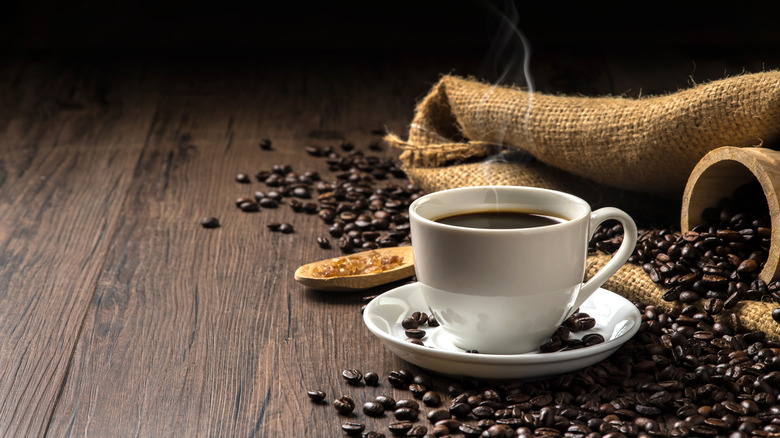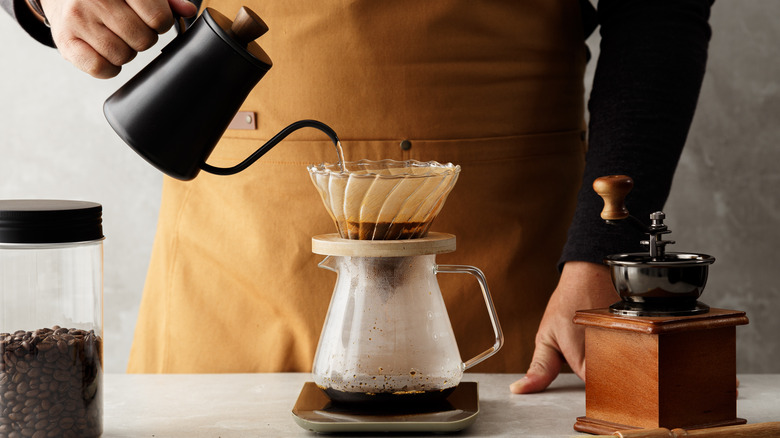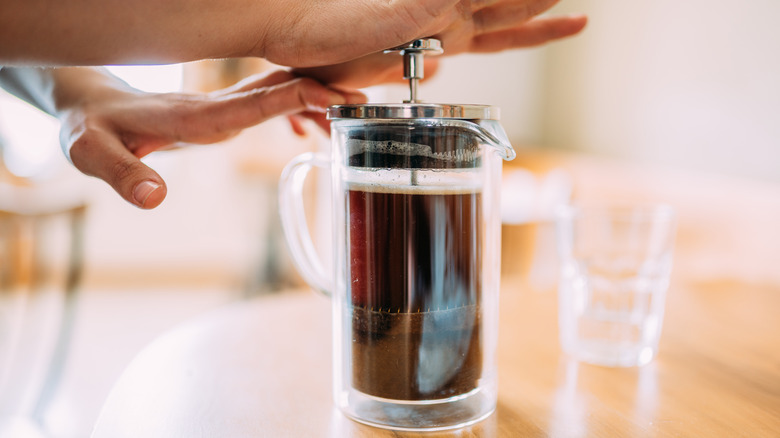Pour Over Vs. French Press Coffee: What's The Difference?
For a drink so universally beloved, coffee can inspire a lot of conflict, separating erstwhile allies into competing camps of French press, drip coffee, or pourover, and leading them to search for ever more obscure ways for brewing the perfect cup.
This level of debate can also make it that much more difficult for people who are not hardcore coffee fans, as the differences between brewing methods can seem minuscule, and the extra effort can seem like a lot when we have already built machines that can literally make coffee for you while you sleep. All the different coffee terms, styles, and brands, or "best ever" brewing methods can overwhelm you until you just settle for the free office coffee and call it a day.
The confusion around coffee is a shame because, despite all the options and disagreements, it's not that complicated of a process. Yes, there are a few variables, like the grind, roast, and water temperature, but once you learn the basics, it gets pretty easy to make a good cup that will satisfy 99% of people.
According to Bon Appétit, even the most skilled baristas will admit that making coffee comes down far more to personal taste than a "right" way to do things. If you are interested in brewing your own coffee, French press and pourover are two of the more popular options. They will produce different outcomes for sure, but both have their advantages and can deliver a tasty drink if done right.
What is pourover coffee?
Pourover coffee is exactly what it sounds like: A method of brewing that simply involves pouring hot water over ground coffee in a filter. Taste of Home points out that this is essentially the same process as your drip coffee maker, but pourover gives you more direct control over the final outcome. The main things you need are a pourover dripper like a Hario, along with a kettle and coffee filters, and ideally, a digital scale for weight measurements. It's essential to do a series of four circular pours of hot water into the coffee. The first "blooms" the grounds to draw out flavor, then the next three pass through the coffee to brew the perfect cup.
Why go through the trouble? Serious Eats states that pourovers produce smooth coffee because fresh water filters through each round. This way, you are less likely to over-brew and draw out the bitter, unpleasant flavors that can form when grounds sit in hot water too long. It also gives experienced brewers the ability to manipulate variables like brewing time to their taste.
The downside is the need for precision: Your water should be 200 degrees Fahrenheit to strike the right balance, and you need a medium-coarse grind on your coffee, meaning pre-ground bags may be too fine. You also need to wet all the grounds equally by circling your pours; otherwise, you could over brew one section and end up with bitter or sour notes.
What is French press coffee?
Compared to the pourover, a French press produces a stronger, more robust cup of coffee. This is because the press is designed to fully immerse the grounds in water and then steep and saturate for several minutes, drawing out a more concentrated flavor.
Food Network explains that a French press is a carafe with a separate plunge-able mesh filter, and like a pourover, it is best to use coarse-ground coffee, as fine grounds can sift through the filter or make the coffee too bitter. Brewing is simple, however, as you pour water that is just short of boiling on the grounds, steep for 3-4 minutes, then push down the filter and pour.
A French press has the advantage of an easier brewing process than a pourover, and it is good for people who like strong coffee. Beyond flavor, it also produces a coffee with a thicker body, which can be nice compared to a pourover. However, Good Housekeeping notes that French press preparation is important, as the long steep means water that is too hot or an improper grind has a bigger negative impact.
It also produces more sediment than pourover, which adds to the texture, although you may find the sediment unpleasant. In the end, the French press and the pourover require some extra effort and equipment, with the choice coming down to personal taste between a smoother or stronger brew and the control of the pourover or ease of the French press.


